This Special Release presents data on construction statistics from approved building permits in Quezon City for the second quarter of 2021. Figures are based on the preliminary results of the tabulated data from collected building permits.
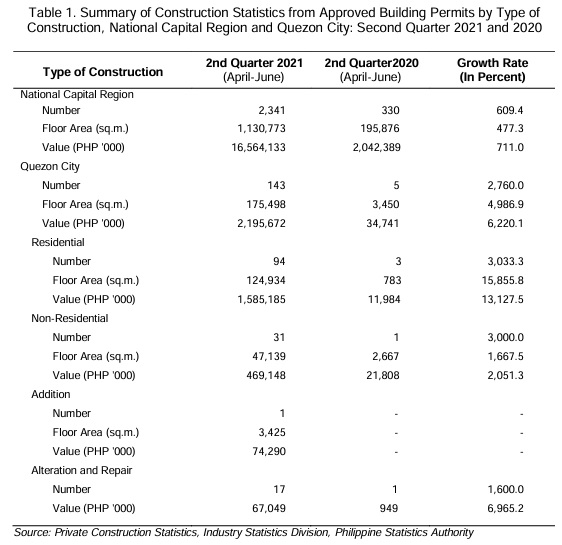
Quezon City records an increase by 138 building permits in the second quarter of 2021
The total number of new construction projects from approved building permits in Quezon City increased by 138, from five building permits in the second quarter of 2020 to 143 building permits in the same quarter of 2021. Similarly, the value of building construction increased by approximately PhP 2.16 billion, from Php 34.74 million in the second quarter of 2020 to PhP 2.20 billion in the same quarter of 2021.
Relative to the entire NCR, Quezon City contributed 6.1 percent to the total number of approved building permits and 13.3 percent to the total value of construction during the second quarter of 2021. (Refer to Table 1 for details)
In addition to the total approved building permits, during the second quarter of 2021, additions and alterations/repairs went up by 17, which is equivalent to 18 building permits as compared to one building permit in the same period of the previous year.
Figures 1 and 2 present the percentage distribution of the number and value of construction for Quezon City by type during the second quarter of 2021. (Refer to Table 1 for details)
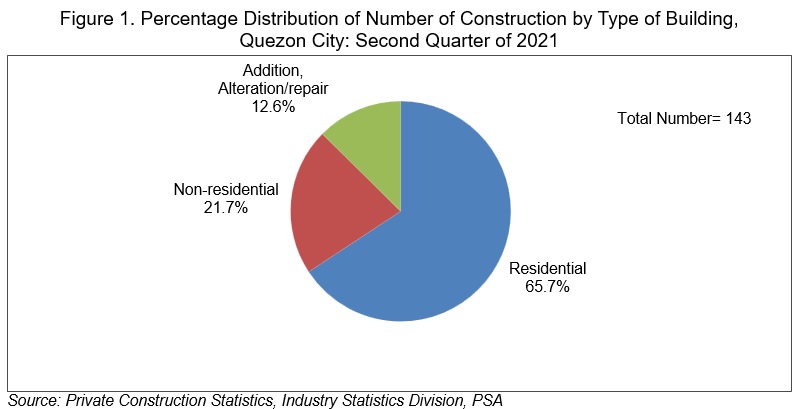
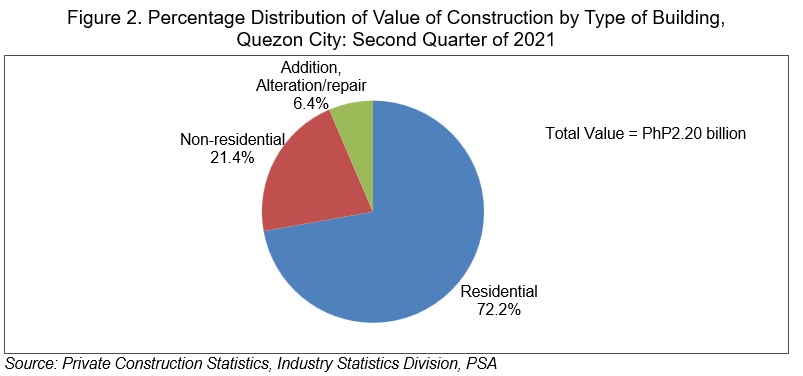
Residential type of construction contributes 65.7 percent of the total number of construction in Quezon City
In terms of the number of constructions per type, residential buildings registered the highest number of approved building permits in Quezon City with 94 or 65.7 percent. Addition and alteration/repair constitute a total of 18 or 12.6 percent of the total approved building permits in the second quarter of 2021 while the remaining is accounted for non-residential building construction with 31 applications or 21.7 percent. (Refer to Table 1 for details)
Figure 3 compares the number of constructions by type of residential building in Quezon City for the second quarter of 2021 and 2020.
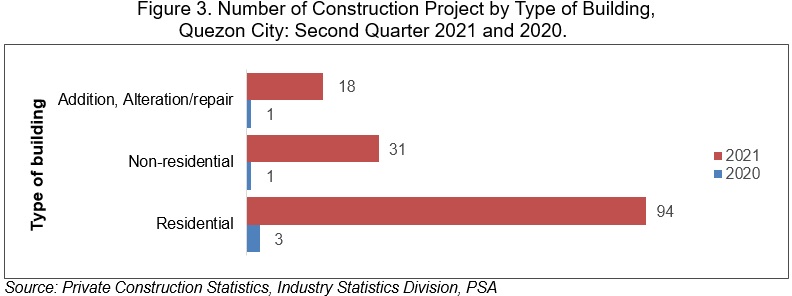
Value of construction for residential type of building marks an increase of PhP 1.57 billion in the second quarter of 2021
The collective value of construction for residential type of building in Quezon City marked an increase by over PhP 1.57 billion, from PhP 12.00 million during the second quarter of 2020 to PhP 1.59 billion in the same quarter of 2021. Similarly, the value of construction for non-residential type of building increased by 22 times, from PhP 21.81 million in the second quarter of 2020 to PhP 469.15 million in the same quarter of 2021. Meanwhile, an increase in the total value of additional and alteration/repair recorded a sharp rise from PhP 0.95 million in the second quarter of 2020 up to PhP 141.34 million in the same period of 2021.
Figure 4 compares the value of construction by type of residential building in Quezon City for the second quarter of 2021 and 2020. (Refer to Table 2 for details)
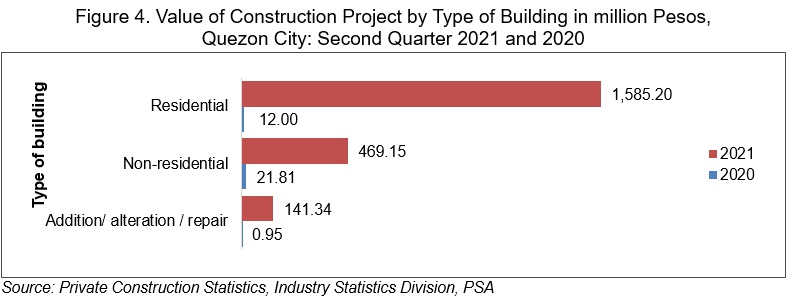
Apartment/Accessoria residential units record the highest number while residential condominiums record the highest value of approved building permits
Among the types of residential building, apartment/accesoria units registered the highest number of approved building permits in the second quarter of 2021 with 56 applications, which is 59.6 percent of the total number of residential building construction. On the other hand, residential condominium recorded the highest value of construction amounting to PhP 1.19 billion or 75.2 percent of the total value of residential building construction. (Refer to Table 2 for details.)
Figure 5 presents the number of residential building construction in Quezon City by type during the second quarter of 2021 and 2020.
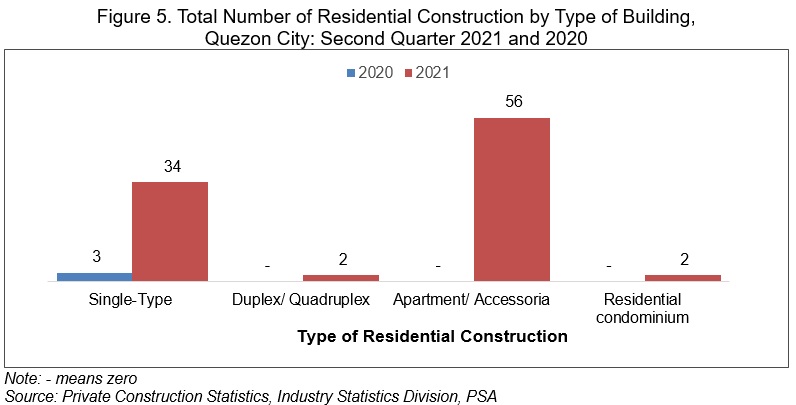
Figure 6 presents the value of residential building construction for Quezon City by type during the second quarter of 2021 and 2020.
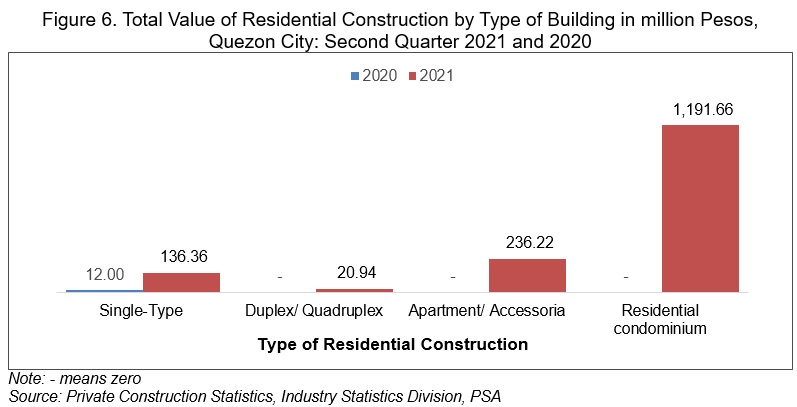
Commercial type of building ranks the highest in number among non-residential building construction
In the second quarter of 2021, the total value of non-residential buildings was at PhP 469.15 million with a total number of 31 approved applications.
Among the types of non-residential building, commercial buildings recorded the highest total number with 26 approved applications and with an aggregate value of PhP 247.31 million during the second quarter of 2021. Institutional building recorded an increase from zero of the second quarter of 2020 to four approved applications of the same quarter of 2021 with simultaneous increased value from PhP 0.00 in 2020 to PhP 38.80 million in 2021. Meanwhile, one building permit was approved for industrial building in the second quarter of 2021 with a value of PhP 1.52 million. (Refer to Table 2 for details.)
Figures 7 and 8 present the number and value of non-residential buildings in Quezon City by type during the second quarter of 2021 and 2020. (Refer to Table 2 for details.)
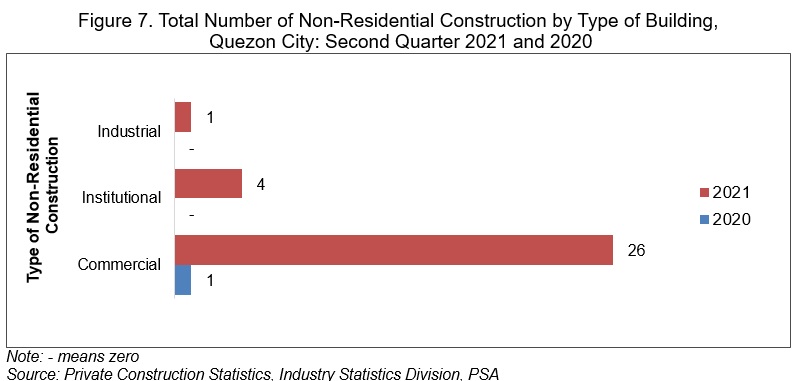
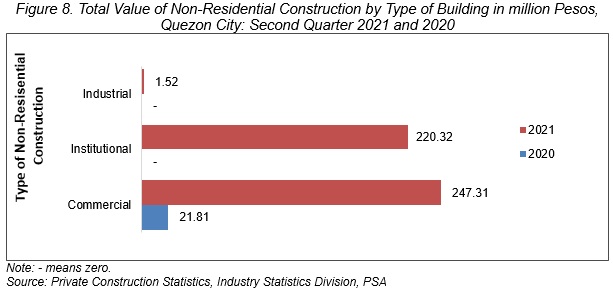
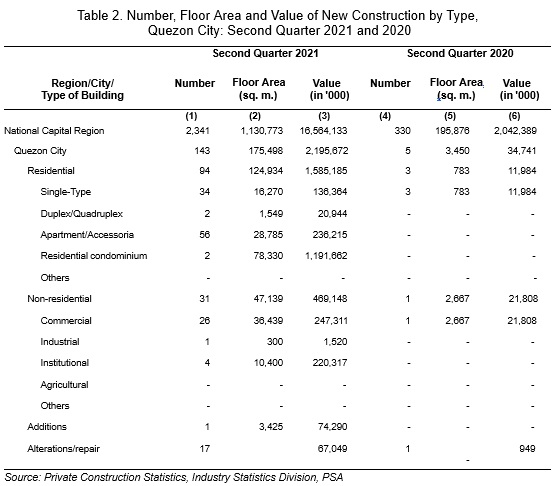
TECHNICAL NOTES
CONSTRUCTION STATISTICS FROM APPROVED BUILDING PERMITS
Scope and Coverage
Construction statistics from approved building permits relate to administrative-based data on new constructions and additional, alterations and repairs of existing residential and non- residential buildings and other structures proposed to be constructed in all cities and municipalities of the country in a specific period.
Sources of Information
Construction statistics are compiled by the Philippine Statistics Authority (PSA) from the copies of original application forms of approved building permits as well as from the demolition and fencing permits collected every month by the PSA field personnel from the Offices of Local Building Officials (LBOs) nationwide.
Limitations
1. Data on building constructions refer to those approved applications during the reference period and not to construction work completed during the reference period.
2. The completeness of the number of building permits collected relies on the approval of applications filed with the LBOs. Hence, private building constructions without approved building permits are excluded in the tabulation of data.
Geographic Classification
Building constructions are classified and presented by geographic area using the Philippine Standard Geographic Classification (PSGC) as of December 2020. The PSGC contains the latest updates on the official number of regions, provinces, cities, municipalities and barangays in the Philippines.
Industry Classification
Construction statistics utilizes the 2009 Philippine Standard Industrial Classification (PSIC) to identify the industrial classification of the structure proposed for construction through its use or character of occupancy.
Collection
The number of building permit forms accomplished by the applicant comes in five (5) copies. The “PSA copy” of the approved building permit is made available within the first five (5) working days after each reference month. Collections of these documents from the LBO in city/municipality are undertaken by PSA field personnel within this period.
Collected documents for each month are properly checked as to its completeness by verifying the beginning and ending numbers indicated in the permit numbers. Missing numbers are indicated, with corresponding reasons, in the transmittal. In cases where there is no construction in a given month in a municipality, a certification that there was no approved building permit during the reference period is provided by the LBO to the PSA field staff.
Data Processing
Data processing of approved building permits is done both manually and mechanically. Copies of documents collected from the offices of LBOs are properly controlled, sorted, edited and coded, folioed and encoded in the PSA provincial offices. During machine validation, inconsistent and invalid entries which are flagged in an error listing are corrected in the data file. This process is repeated until there are no more inconsistent or erroneous entries found in the error listing. The data files are then forwarded to PSA Central Office for validation, consolidation and generation of preliminary tables. Data files received after the cut-off dates of submission set for each quarter are included in the generation of annual tables.
Preliminary results are based on data files that have undergone data processing in the provincial offices and have been validated at the Central Office. The preliminary tables are revised to include building permit documents received after the cut-off period in the annual tabulation.
Statistics Generated
Construction statistics generated from approved building permits provide monthly administrative-based data on building construction at the municipality level nationwide. Statistics generated are the following:
• number
• floor area
• type of construction
• value of construction
Statistical Tables
The statistical tables are presented at the regional and provincial levels by type of construction and by period according to form of ownership.
Unpublished Data
Aside from the preliminary tables posted in the PSA website, annual, quarterly and monthly statistical tables at the municipality level by type of construction and by form of ownership are available at the Industry Statistics Division of the PSA.
Other special tabulations may also be made available upon request, addressed to the National Statistician, Philippine Statistics Authority, 3rd Floor CVEA Building, East Avenue, Quezon City.
Dissemination
Preliminary and final results of construction statistics generated from approved building permits are made public in the form of Quarterly Special Releases posted in the PSA website (www.psa.gov.ph) 65 calendar days after the reference quarter and Annual Special Release, eight months after the reference year, respectively. The Quarterly Special Releases are reports containing the preliminary results of construction statistics generated 60 days after the reference quarter while the Annual Special Release is a consolidated report of the quarterly preliminary data incorporating documents which are submitted after the cut-off dates for each quarter.
Definition of Terms
(Adopted from the Revised and Updated IRR of the National Building Code)
Building permit is a written authorization granted by the LBO to an applicant allowing him to proceed with the construction of a specific project after plans, specifications and other pertinent documents have been found to be in conformity with the National Building Code (PD 1096).
Building refers to any independent, free-standing structure comprised of one or more rooms or other spaces, covered by a roof and enclosed with external walls or dividing walls, which extend from the foundation to the roof.
Construction refers to all on-site work done from site preparation, excavation, foundation, assembly of all the components and installation of utilities, machineries and equipment of buildings/structures.
Residential building is a building for which its major parts or more than half of its gross floor area is built for dwelling purposes. This type of building can be of the single type, duplex, an apartment and/or accessoria and residential condominium.
Single house is a complete structure intended for a single family or household, i.e. bungalow, 2-storey house, nipa hut.
Duplex house is a structure intended for two households, with complete living facilities for each; it is a single structure divided into two dwelling units by a wall extending from the floor to the ceiling.
Apartment is a structure, usually of two storeys, made up of independent living quarters, with independent entrances from internal walls and courts.
Accesoria is a one or two-floor structure divided into several dwelling units, each dwelling unit having its own separate entrance from the outside.
Residential condominium is a structure, usually of several storeys, consisting of multiple dwelling units.
Other residential construction consists of school or company staff houses, living quarters for drivers and maids, and guardhouses.
Non-residential building includes commercial, industrial, agricultural and institutional buildings.
Commercial buildings refer to office buildings and all buildings which are intended for use primarily in wholesale, retail and service trades; i.e. stores, hotels, restaurants, banks, disco houses, etc.
Industrial buildings are all buildings used to house the production, assembly and warehousing activities of industrial establishments; i.e. factories, plants, mills, repair shops, machine shops, printing press, storage plant, electric generating plants.
Institutional buildings are buildings which primarily engaged in providing educational instructions and hospital/health care; ports, airports and other government buildings; i.e. school, museums, libraries, sanitaria, churches, hospitals.
Agricultural buildings are buildings used to house livestock, plants and agricultural products such as barn, poultry house, piggeries, stables, greenhouses and grain mill.
Other non-building constructions include cemetery structures, street furniture, waiting sheds, communication towers, etc
Addition refers to any new construction which increases the height or area of an existing building/structure.
Repair is a remedial work done on any damaged or deteriorated portion/s of a building/structure to restore its original condition.
Renovation is any physical change made on structures to increase the value, quality and to improve the aesthetic.
Alteration is a construction in a building/structure involving changes in the materials used, partitioning and location/size of openings, structural parts, existing utilities and equipment but does not increase the overall area thereof.
Conversion is a change in the use or occupancy of structure or any portion thereof, which has different requirements.
Demolitions refer to the systematic dismantling or destruction of a building/structure, in whole or in part.
Street furniture are street structures consisting of monuments, waiting sheds, benches, plant boxes, lampposts, electric poles and telephone poles.
Floor area of building refers to the sum of the area of each floor of the building measured to the outer surface of the outer walls including the area of lobbies, cellars, elevator shafts and all communal spaces in multi-dwellings. Areas of balconies are excluded.
Total value of construction refers to the sum of the cost of building, electrical, mechanical, plumbing, and others. The value is derived from the approved building permit and represents the estimated value of the building or structure when completed.
For more details, please visit www.psa.gov.ph
(SGD) APOLINAR F. OBLEA
Chief Statistical Specialist
Attachment:
1. Technical Notes
